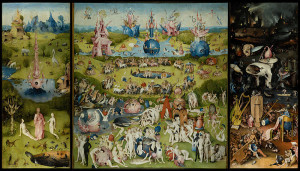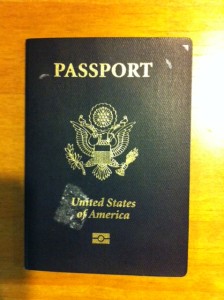
First setting eyes on The Garden of Earthly Delights, by Hieronymous Bosch, was for me a numinous experience
Previously, I wrote about hodophobia: the fear of travel, and some ways to conquer it.
Today’s topic is a bit more fun and upbeat: some less-known — and generally quite obscure — terms that reflect the essence of the love and fascination of travel. (Some aren’t confined strictly to travel, but offer insight into it.) Some of the terms are from English, and some from other languages.
The latter are particularly interesting to me because they capture some nuances that English does not. (And because of that, I may miss some of that nuance — so if you’re among the native Portuguese, German, or Swedish speakers who follow this blog, please free to correct me.)
Let’s start with a pure travel term that’s the opposite of hodophobia: hodophilia.
Hodophilia (English, noun)
Hodophilia — which comes from the ancient Greek for hodos, or journey, and “philia,” meaning love or affection — is simply the love of travel. And a hodophile is someone who is “afflicted” with hodophilia, to which I plead guilty — some would say in the extreme.
I don’t know if there’s a “cure” for hodophilia, but if so, I don’t want to know it.
Solivagant (English, noun)
Perhaps you’re a solivagant.
Taken from Latin roots soli (alone) and vagus (to wander), solivagant, as you might imagine, means solitary wanderer. While not every solivagant is happy with his or her condition, the word typically implies someone who enjoys the art of traveling alone.
For a good read from the solivagant perspective, I suggest checking out this post from blogger Ellen Perlman of “Boldly Go Solo”: “Travel Companions Who Make Solo Travel Look Glorious.”
Ellen introduces us to some travel companions — the “faffer,” the “whinger,” and the “waverer”– that would turn many of us into at least temporary solivagants.

An Egyptian solivagant. Photo by Dennis Cox/WorldViews
While facing a table for one might deter many travelers, the solivagant sees traveling at one’s own pace and according to one’s own tastes as preferable to negotiating with another person or persons on how to plan for and carry out a trip.
Saudade (Portuguese, noun)
Have you ever experienced a wistful longing for a place you’ve never been to or even know exists?
I’m glad to know there’s a term that fits it — saudade — because it’s one of the driving forces behind my own travel obsession.
I suppose it’s the idea — conviction, really — that somewhere on earth is the elusive Shangri-La that you can’t quite define. Maybe it’s nostalgia for a “golden era” of the past that never really existed but that you keep alive in your imagination.
It has a melancholic connotation (the Portuguese are big on melancholy, as judging by their mournful fado music) that you’ve lost something you love but can’t or don’t want to let go of it.
For the Portuguese (and Brazilians), saudade doesn’t always or even mainly refer to travel, but it fits very well into the idea that eventually, if you seek out enough places, you may find that elusive destination that haunts your dreams (but probably not).
Sehnsucht (German, noun)
Sehnsucht is much like the concept of saudade, but perhaps without as much of the melancholy.
If you can’t quite describe what you’re longing for but you feel it’s out there somewhere if you just keep looking, you’ve experienced sehnsucht. It’s a yearning or craving for an ideal — which in travel terms translates to, once again, that Shangri-La type place that may not even exist.
But being in the grip of Sehnsucht, you keep looking anyway.
Resfeber (Swedish, noun)

A bad case of resfeber?
Among the many wonderful words you may encounter in Sweden is resfeber, which refers to a kind of pre-trip anxiety you may feel before setting off.
As I described it in my post on hodophobia, it’s a common and mostly harmless sense of the jitters that everyone feels from time to time — whether it’s fear of missing your flight, anxiety about safety issues, or just wondering whether you’ve packed too much or too little.
But in a more positive way, it can also refer to the pre-trip excitement and anticipation that can make your stomach flutter a bit — and it usually means a little of both.
As soon as you reach your destination the sense of resfeber should go away. (Maybe the Swedes have a word for jitters and excitement during a trip, I don’t know.)
Dépaysement (French, noun)
Meaning a “change of scenery,” dépaysement means not feeling at home in a foreign country or culture — but this can be either good or bad, depending on your perspective.
For instance, I usually travel in search of some good old-fashioned dépaysement — the more exotic, the better. Of course, if I find myself drawn to a Starbucks in Japan, then I’m probably feeling some nostalgia for something familiar.
Novaturient (English, adj.)
This one has its roots in the Latin word novus, or “new.”
It signifies a feeling that you’re looking to change your life and escape the same-old, same-old routines to try something new — a key component of travel for many people.
For instance, you may feel stuck in your job or hometown and want to experience something completely different on foreign shores. While not always used in a travel context, novaturient certainly fits a case of wanderlust.
Numinous (English, adj.)
Taken from the Latin root numen (arousing spiritual emotion), numinous describes an awe-inspiring, almost religious-type experience that may provoke “fear and trembling” but also fascination.

Uh oh, I feel a bout of passsportarianism coming on.
In the travel realm, it might refer to a numinous reaction to an artwork in a museum, or to a sacred ruin, or to a magnificent landscape that transcends normal feelings of admiration.
I’m sure we’ve all had such experiences during our travels — the kind that provide such power that you remember them decades later as if they were yesterday.
Some of mine have involved paintings — Bosch’s Garden of Earthly Delights, Vermeer’s Artist’s Studio — and others mountains (Switzerland’s Jungfrau, China’s Mt. Huangshan), just to name a few.
When I encountered Vermeer’s Artist’s Studio in Vienna, for instance, I was so transfixed that I stared at it for a good two hours, until the museum was closing. That’s numinous.
Passportarianism (English, noun)
Passportarianism is that sinking, queasy feeling of dread you get when — after a 15-hour flight that has taken you halfway around the world — a grim-looking immigration officer stares at your passport, turns it upside down and sideways, glares at you for what seems like hours, then calls his superior over for serious consultations.
And you really, really need to use the restroom.
OK, I made this one up — but if you’ve ever experienced this scenario, can you deny passportarianism exists?
Note to Readers: Do you know of any other real or imagined obscure travel terms that you’d like to share with other readers? If so, please leave them in the comments section. Thanks!










8 Responses to Are You a Hodophile? No, It’s Not an Insult